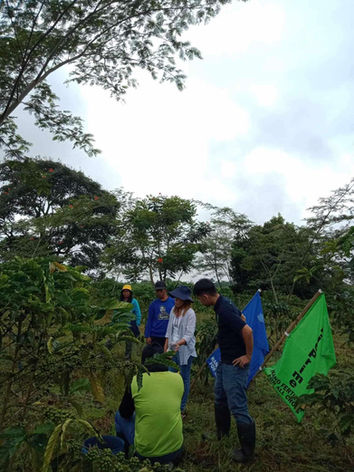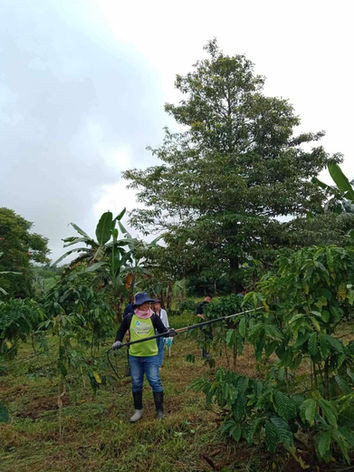



Farmers Grow
Helping coffee farmers Grow!
For many Filipinos, coffee is not just a beverage but a part of their heritage, a part of their life. Our love for coffee and the increasing demand and consumption in the country makes coffee farming a promising business for Filipino farmers.
However, challenges in farm productivity, complicated by effects of climate change, hamper the growth of the profitability of the coffee farmers. The Department of Agriculture’s Philippine Coffee Roadmap 2021-2025 reported that on average, a Filipino coffee farmer only makes around Php 72.92 per kilogram of beans.
Coffee farmers experience low yields resulting from limited access to inputs, logistics, financing, and support services, and poor farming practices. The lack of alignment to the national coffee roadmap, poor farm practices, aging farmers and lack of interest in coffee farming among younger generations also contribute to the continuous drop in coffee production.
The private sector worked with the Government for the approval of the Philippine Coffee Roadmap but insufficient government funding hampered the implementation thereof.

Partners for Growth
Small farmers are the majority of coffee producers in the country. The Government partnering with the private sector, NGOs and like-minded organizations seek to increase the yield of coffee growers and increase farmers’ income and farm productivity, as well as coffee entrepreneurs in the small and medium scale enterprises.
Nestlé, one of the largest manufacturers of coffee in the country, aims to increase local coffee purchases to 20% by 2025. Doing so will open up income opportunities for coffee farmers and contribute to the larger Philippine coffee industry. Through Nestlé's Project Coffee+, some 1,500 coffee farmers in Mindanao tripled their yields and incomes. But the challenge to engage more partners to increase this number and help more coffee farming communities remains.
With these challenges in mind, Nestlé together with the Philippine Business for Social Progress (PBSP) and the Philippines Partnership for Sustainable Agriculture (PPSA) are working together in implementing the Farmers Grow Project to achieve Collective Impact in the lives of these coffee farmers now and in the future, when hopefully, their children will also be inspired to take up farming due its financial viability and to continue their family’s heritage.
The Farmers Grow Project focuses on providing critical inputs to farmers when they need it while sustainably improving the farmers’ agricultural practices and supporting the technical needs of farmer-members of cooperatives, bringing in the collective expertise of the implementing partners. Nestlé provides technology, organization, training on Agripreneurship and Good Agricultural Practices (GAPS), and facilitates links to funding options. Through the NESCAFÉ Plan program, Nestlé works closely with coffee farmers and their communities, the national and local governments, development agencies, and other partners to promote a comprehensive regenerative agriculture model that protects the three key resources of any agricultural system: soil, water, and biodiversity.
While fostering economic viability in coffee farming, the NESCAFÉ Plan also seeks to support farmers in crossing the threshold from sustainability to regeneration. To this end, the program has been sharing Good Agricultural Practices (GAP) in coffee production with farmers and introducing them to regenerative farming principles that will help make coffee-growing more viable for the long term. This is a crucial step in achieving resiliency against the threat of climate change.
On the other hand, PBSP provides on-the-ground implementation, monitoring of results, and community organizing while PPSA supports the program with documentation, knowledge product development, and communications during the project execution.

Finding the right balance
Region X, which includes Bukidnon, is one of the leading coffee producing regions in the Philippines, accounting for 13.51% of the country's Robusta production. The team has selected Bukidnon as the location for its pilot project.
The project adopted 10 coffee farmers from the New Eden Multi-purpose Cooperative (NEMUCO) Cooperative in Pangantucan, Bukidnon. The farmers, ranging from 27 to 43 years old, have been planting a variety of crops with an average of 27 years of cultivating coffee, corn, cassava, sugarcane, banana, camote, and cacao.
In consultations with the NEMUCO coffee farmers, one of the main concerns affecting low coffee yields is the lack of proper crop nutrition. While the cost of critical inorganic fertilizers was recently prohibitive and the amount of organic fertilizers has not been adequately administered, there is a need for a balanced and responsible mix of organic and inorganic fertilizers for a successful crop. The Farmers Grow Project aims to upskill farmers on the right amounts of input application to maximize yields and net farm incomes.
For the first phase of the project, Yara Fertilizers was engaged to supply the mineral fertilizers and training on Crop Nutrition Solution. The fertilizers were provided and agreed to be paid at the end of the cropping season with either discount or premium adjustments based on the yield level. Farmers with yield below average are entitled for discounts whilst farmers achieving the target yield will be applied with minimal premium.

“I observed continuous flowering and early harvesting. I expect to have a big impact on the yield as compared to last cropping season. Harvesting typically starts January to February but for this cropping season, it started as early as the end of November,” said Rolando Roda, one of the coffee farmers assisted by the project.
Starting from a baseline yield of 1,680 kg, the farmers' yield increased to 3,594 kg, marking a total incremental volume increase of 114%. More than 7,000 coffee trees were applied with Yara fertilizers.
The project provided all members of the robusta coffee value chain with the Farmer Connect Responsible Sourcing Training, enabling them to practice sustainable production, processing, and trading of coffee. This training ensures that coffee farming does not contribute to deforestation or biodiversity reduction.

.png)
.png)
“I appreciate the technologies and good practices provided by the project, particularly the pruning and weeding together with the proper application of fertilizer which so far, have good results,” said Severino Dagatan.
To complete the achievement of the balanced fertilization protocol, the project involved new partners, BioPrime, Nature Tech, and Harbest Agribusiness Corporation for the organic fertilizer and biostimulants demo trials.
The project also seeks to maintain partnerships with these fertilizer companies, ensuring they continue supporting farmers. The project will connect these companies with cooperatives and coffee farmers, providing discounts on products and offering a payment scheme called "charged to crop." This approach allows farmers to pay for inputs at the end of the harvest season without paying high interest.
Want to know more about the Farmers Grow Project?
Send us an email at
secretariat@ppsa-ph.org and let's talk about how we can help coffee farmers grow!
















